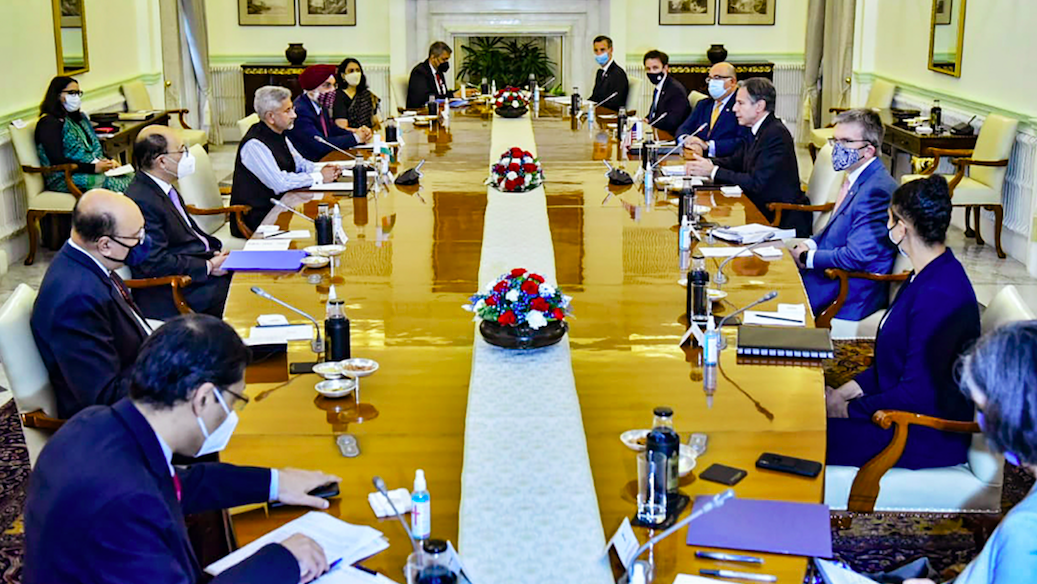Secretary of State Antony Blinken held wide-ranging talks with the Indian leadership during his two-day visit. The agenda included Taliban resurgence in Afghanistan, Indo-Pacific engagement, and boosting COVID-19 measures.
Blinken stressed that strengthening the Indo-US partnership was among Washington’s top foreign policy priorities. His Indian counterpart also spoke about convergent views on regional concerns, and agreement to work together on multilateral issues.
Blinken stated that the Indo-US partnership is not against China, but reaffirmed that both countries share a vision of free, open, and secure Indo-Pacific. Also discussed was China’s belligerence against its neighbours in the South China Sea and the serious face-off with India in Ladakh, where tens of thousands of troops confront each other with tanks, artillery, missiles, and fighter aircraft. Any flare-up can spell disaster.
The situation in Ladakh has been critical since the violent clash of June 2020 wherein 20 Indian soldiers were brutally clubbed to death. Several rounds of talks between senior military commanders have yielded only limited de-escalation. China has blatantly reneged from the agreement to vacate several critical occupied areas.
Following the US withdrawal, the situation in Afghanistan has become volatile since a resurgent Taliban has captured vast areas. China’s assured support to Taliban’s role in a future set-up has bolstered its position.
China recently hosted a Taliban delegation and demanded that it cut all ties with the East Turkestan Islamic Movement, which supports Uyghur separatists in Xinjiang.
With Xinjiang secured, China can advance its Belt and Roads Initiative through the Central Asian Republics. The China-Pakistan-Economic-Corridor (CPEC) will also not face disruption from Afghanistan following its entente with Taliban.

Taliban delegates speak during talks between the Afghan government and Taliban insurgents in Doha, Qatar September 12, 2020.
Unlike NATO, there is no formal alliance to counter China’s hegemonic designs. The nascent Quadrilateral Security Dialogue between the USA, Japan, Australia, and India is not a military alliance; nor is the US-India partnership.
Nonetheless, in Asia, India alone can stand up to China given its location, size, and economy. Peninsular India juts deep into the Indian Ocean and effectively dominates China’s sea routes to Europe and Africa. China’s access to restive Xinjiang is vulnerable to interdiction from the Karakorum Pass on the Sino-Indian border, as is the CPEC to Gwadar on the Arabian Sea.
A senior US official had stated ahead of the visit that Blinken would also raise democracy and human rights issues. Blinken did that, citing rising global threats to democracy and freedoms, calling it “democratic recession.”
In a meeting with civil society leaders, he highlighted that Americans and Indians believe in human dignity, equality of opportunity, rule of law, and fundamental freedoms of religion and beliefs. He lauded the shared commitment to democratic values, describing it as “bedrock of our relationship and reflective of India’s pluralistic society and history of harmony.”
However, why such extensive emphasis on democracy between two well-established democracies when critical Afghanistan, Indo-Pacific, and the pandemic issues were on the agenda? Why did he publicly assert that all people deserve to be heard by their government and treated with respect?
In closed-door parleys, he underscored US concerns more explicitly.
Strategic value of the Indo-US partnership is predicated upon a democratic and pluralistic India, which has been an island of stability in a volatile region surrounded by a wide swath of Islamic states. While some of them nurtured extremism and Salafi ideology, but even Al-Qaeda’s mobilisation did not affect India’s 175 million Muslims due to her secular foundations.
However, for the past several years increasing militancy of outfits under the Rashtriya Swayamsewak Sangh (RSS) has been causing sharp religious polarisation. Given its goal of a theocratic Hindu Rashtra, nurtured since the 1930s, the RSS propagates Hindutva, a militant ideology to avenge centuries of Muslim rule.
Since 2014, RSS affiliate, the ruling Bhartiya Janta Party (BJP) has condoned the brazen spawning of hatred and communal riots by its zealots. Muslims feel alienated due to social intimidation and coercive laws. Hindutva advocates in high institutional positions insidiously fan such polarisation for electoral gains.
Another worrisome question is whether the traditionally secular Armed Forces are now affected by this ideology. Regrettably, former Army Chief General V.K. Singh donned the RSS uniform and joined the BJP immediately after retirement and numerous veterans post polarising comments on social media.
This, as well as hate speeches by RSS-BJP leaders, anti-Muslim propaganda, intelligence reports, and pressure from Congressional committees impelled the Biden administration to convey its concerns.
Anger is also mounting against government ineptitude in pandemic management that caused 425,000 deaths due to oxygen shortages and policy flip-flops. While mainstream media, contemptuously labeled “lapdogs,” glossed over the government’s blunders, videos of floating corpses and mass cremations from intrepid journalists such as Reuters’ Danish Siddiqui exposed its lies and false statistics.

Family members of Vijay Raju, who died due to the coronavirus disease, mourn before his cremation at a crematorium ground in Giddenahalli village on the outskirts of Bengaluru, India, May 13, 2021.
Peoples’ frustration is coalescing around the government’s fascist policies and incarceration of activists, journalists, and critics under draconian laws like sedition.The government passed, without discussion, three anti-farmer laws that favour crony capitalists, forcing thousands of farmers to camp outside Delhi for over nine months. In desperation, people are now protesting fearlessly against skyrocketing prices, unemployment, and Pegasus ‘snoop-gate.’
Increasing political and socioeconomic turmoil threatens the value of the strategic partnership. The USA is concerned that if 175 million alienated Muslims garner support from Islamic nations, it would not augur well for regional stability.


























































































